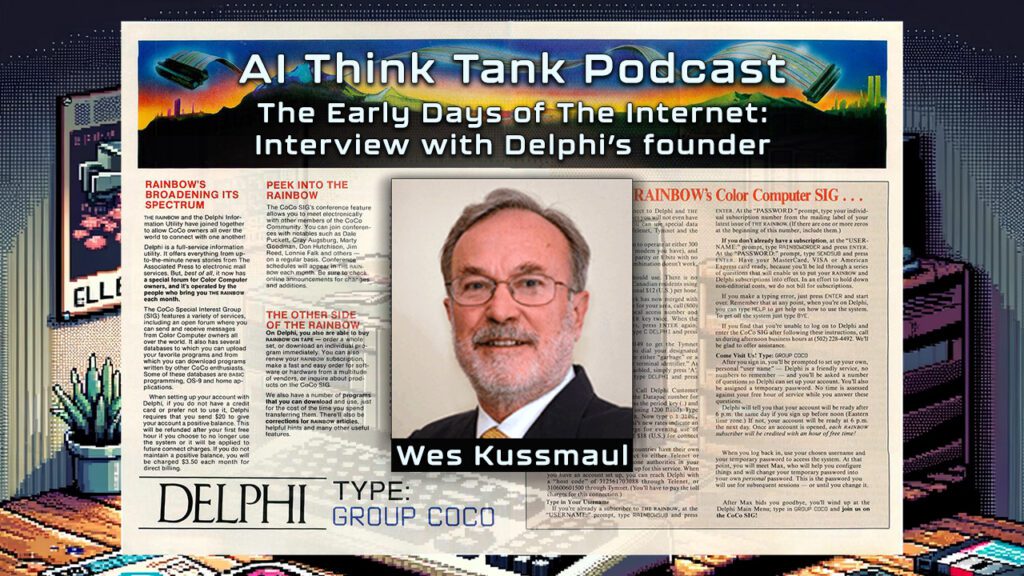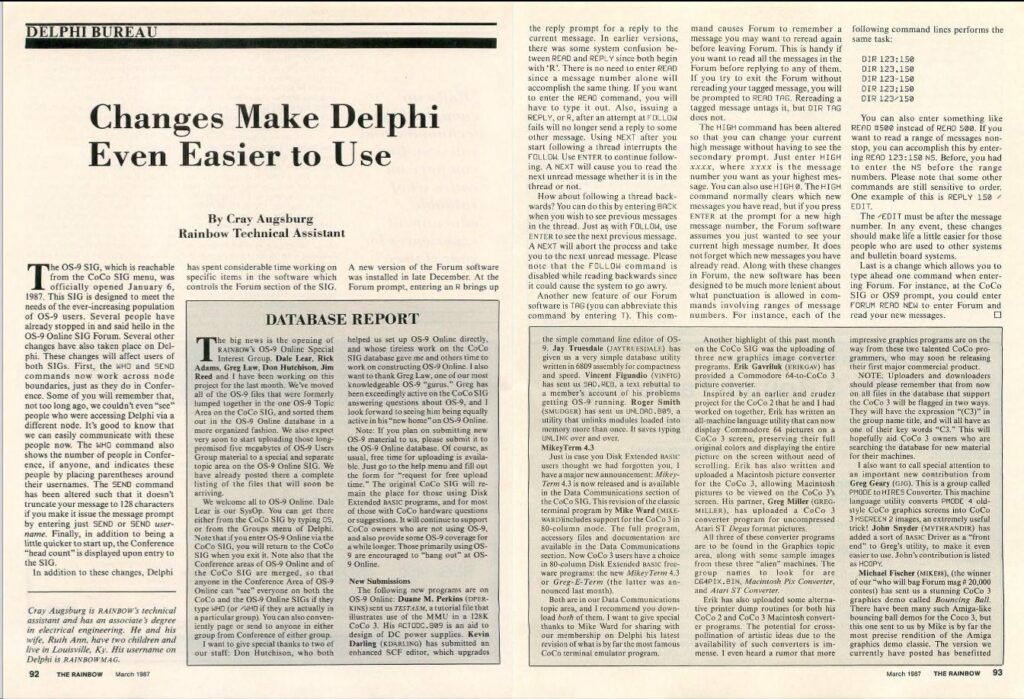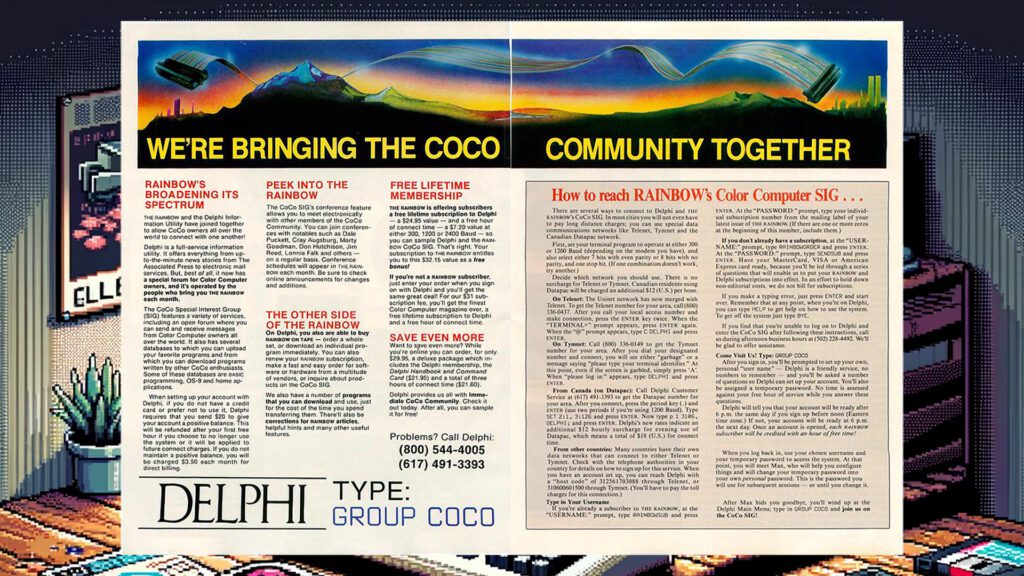Interview with Wes Kussmaul

If you were using computers in the early 80s, this interview is for you! I had the extreme honor of hosting Wes Kussmaul, an internet pioneer whose work has significantly shaped the landscape of online privacy and security. Wes is the creator of the first online encyclopedia, Delphi, and a founding member of the Authenticity Alliance. Our conversation delved into the early days of the internet, Rainbow Magazine, the evolution of social media, and the ongoing challenges and solutions in the realm of digital security.

I got to dig up digitized copies of the old Rainbow Magazines and surprise Wes with glimpses of his own 2-page advertisements from Delphi. It was a real treat for me as these magazines were as close as I ever got to the outside world of computing at the time.

The Genesis of Online Social Media
Wes’s journey began in a world vastly different from today’s internet-driven society. He quit his job at Technotronics to create the Kussmaul Encyclopedia, which eventually evolved into Delphi—the precursor to modern social media platforms. Reflecting on those early days, Wes noted, “Social media saved our butt in 1982 when we had been losing money. We added social features, bulletin boards, SIGs, and email, which saved us from oblivion.”

This shift marked the beginning of a new era where online communities could interact and share information, albeit in a much more rudimentary form than what we experience today. Wes reminisced about the early internet, saying, “You didn’t get there via TCP/IP as you do now with the web. It was an old protocol called X25.”

The Birth of the Commercial Internet
As the internet matured, the lines between commercial and non-commercial use began to blur. Wes shared a fascinating story about the creation of CIXNET, a pivotal moment in the commercialization of the internet. “Two smart guys in Aurora, Colorado, created CIXNET to take commercial traffic away from the NSF internet backbone,” he explained. This move catalyzed the commercial internet, leading to the development of services like AOL, which revolutionized online connectivity and accessibility.

Grassroots Technology and the Power of Community
Our discussion also touched on grassroots technology efforts and their impact on community connectivity. Wes recalled projects like the Seattle Wireless Project, where local minds created directional Wi-Fi beams using simple materials like Pringles cans. These initiatives provided crucial internet access in areas with limited coverage, demonstrating the power of community-driven technological innovation. He mentioned, “Even now, there’s a group in Boston building a mesh network using end-to-end encrypted nodes.”
The Rise of Privacy and Security Concerns
The conversation naturally transitioned to the critical issue of online privacy and security. Wes’s post-Delphi endeavors have focused on these areas, advocating for the use of Public Key Infrastructure (PKI) to ensure secure and reliable online identities. “Your information should be your personal intellectual property,” Wes emphasized, highlighting the importance of keeping personal data secure and private.
One of the major challenges in implementing PKI on a large scale is the perception of central authority. Wes addressed this by proposing a participatory model of governance, akin to municipal governance. He explained, “The city of Osmio represents authority and is a global city hall, a certification authority, but it is non-commercial and approachable.”
Real-World Applications of PKI
Wes’s work with the Authenticity Institute has led to practical applications of PKI in various fields. He mentioned Authentimatch, a service aimed at creating reliable identities for dating services to combat fraud. “The problem is that dating services are fraught with synthetic identities and fraud. Authentimatch provides a platform where the identities of all participants are measurably reliable,” he explained.
The concept of identity reliability extends beyond dating services. It can be applied to any online platform where authenticity and accountability are crucial. Wes highlighted, “These identity certificates are universal. If you enroll in Authentimatch, that same identity certificate can be used for other services like blogging, ensuring trust across platforms.”
The Path Forward
As we wrapped up our conversation, Wes stressed the importance of moving towards a system where online identities are secure and reliable. He believes that the key to solving many of today’s security issues lies in the widespread adoption of PKI and digital signatures. “We have the solution. The solution is accountability and measurably reliable identities represented by X.509 identity certificates.”
Wes’s insights provide a compelling vision for the future of online privacy and security. His work underscores the need for a robust and reliable digital identity infrastructure, one that empowers individuals and protects their personal information in an increasingly interconnected world.
For more information on Wes’s initiatives and to explore the innovative solutions he’s developing, visit Authentiverse.net and reliableid.com.
Join us as we continue to explore the cutting-edge of AI and data science with leading experts in the field.
Subscribe to the AI Think Tank Podcast on YouTube. Would you like to join the show as a live attendee and interact with guests? Contact Us

